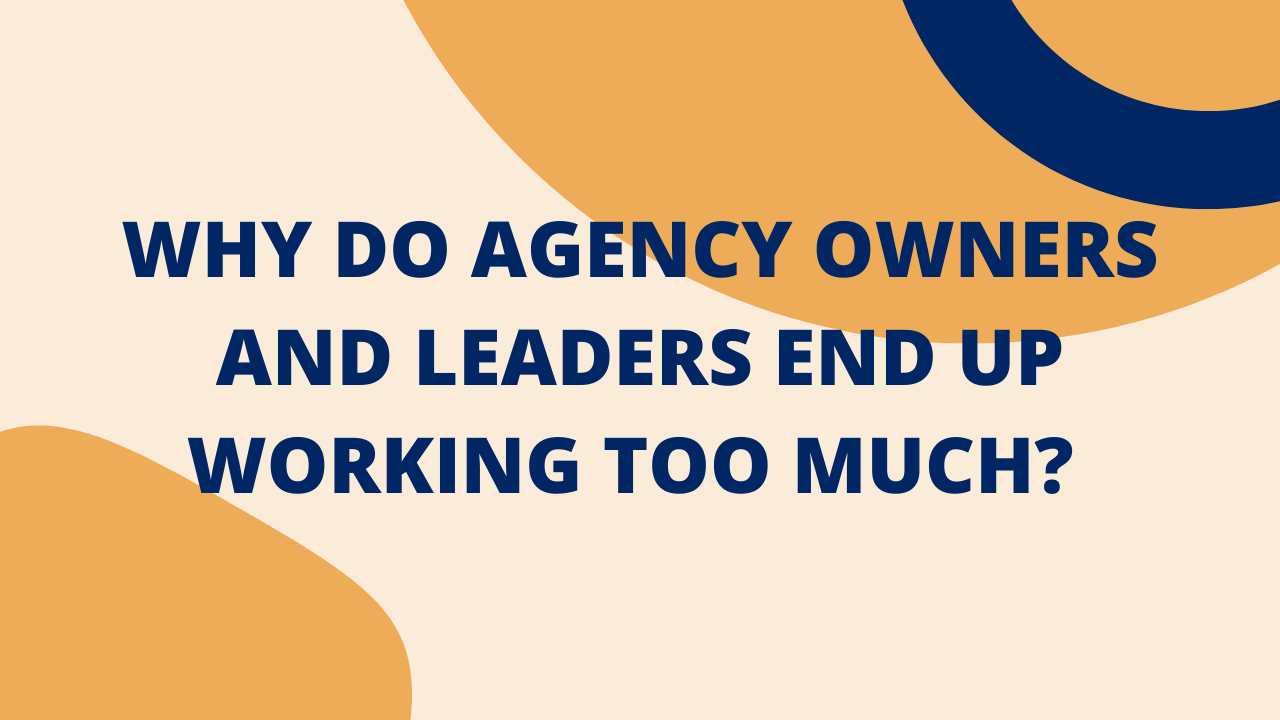Why Do Agency Owners and Leaders End Up Working too Much?
Nov 14, 2022
There are many reasons why agency owners and leaders might regularly put in 14-hour days.
We haven’t run into anyone, though, who actually wants to work this much. In fact, many owners come to us frustrated because they seem to have created a job they don’t even want instead of a business asset they own.
Further, agency leaders play an essential role in creating company culture. If they constantly work with the “I’ll sleep when it’s done” mindset, it breeds unsustainable norms that result in unhappy employees and high turnover rates.
Unfortunately, the way agencies have been run for decades usually causes someone to be taken advantage of (often unintentionally). In boutique agencies especially, that person is usually the owner.
In our Agency Audits, we find that owners are overworked because they don’t want to overwork their team. We can’t fix this simply by working less–typically there are foundational issues that need to be addressed first.
Below, we’re sharing the most common reasons that cause agency owners to work too many hours and high-level recommendations on how to gain back time (and sanity & sleep!).
Learn how to lead client meetings strategically here
Undercharging
When an agency is undercharging for services, it's caught in a vicious cycle of adding more clients to compensate for low revenue numbers. This results in more work, but never enough resources to appropriately pay people to deliver that work. When this happens, leaders are often the ones taking on extra work when the team is at capacity. This leads to extreme burnout and exhaustion.
Many think the solution is simple–charge more! While yes, that is part of the equation, it’s not the total answer. First, we recommend agency owners revamp their business model and team structure so client delivery is not as dependent on them. Second, it’s imperative to understand what it actually costs to deliver client work. These two factors are the first steps in moving away from a business that runs you and instead, owning a highly valuable business asset.
Compensating for subpar team performance
While attitudes in the industry have changed when it comes to client boundaries (gone are the days in which 9 p.m. client calls are appropriate!), there's a rise in boundary issues among leaders and their team.
Why is this happening? With the current hiring market, we’re seeing a pattern among agency leaders who are filling in the gaps for subpar performance from team members. It’s a challenge to find good talent right now, and many agency owners and executives are finding themselves compensating for team members who aren’t fully meeting the expectations of their role.
While it might not be the right time to let a team member go, it is essential to recognize if this is happening in your agency, and instead of maintaining a very uncomfortable status quo, make proactive plans to improve the situation.
Ineffective delegation
Effectively delegating is important for time management across the entire team. However, as an owner or leader, it’s common to feel like it all falls on your shoulders, which contributes significantly to overworking.
When owners and executives feel they can’t delegate tasks and projects off their plates, many don’t realize there is usually a delegation issue throughout the entire team. For example, we commonly see that because Account Executives aren’t delegating to Coordinators or Interns, they’re not spending enough time on day-to-day execution work. This means that senior strategists or Account Managers & Directors have to step in on more execution than they should, leaving less time for strategy.
When this happens, agencies often find themselves with lackluster results, which is the most common reason an owner has to step in to save the day and turn a campaign around.
To prevent the scenario above from happening, prioritize teaching everyone (at every level!) how to delegate effectively.
Learn more about setting and maintaining client expectations here.
Recognizing why you’re working too much, understanding how it’s affecting your team and agency, and making the small changes necessary to cultivate a sustainable, healthy workplace is a critical element to sustainable agency operations.
If you’d like to learn more from the Advocation team on best practices for PR & marketing agency teams, follow us on social media–Instagram, LinkedIn and YouTube.


